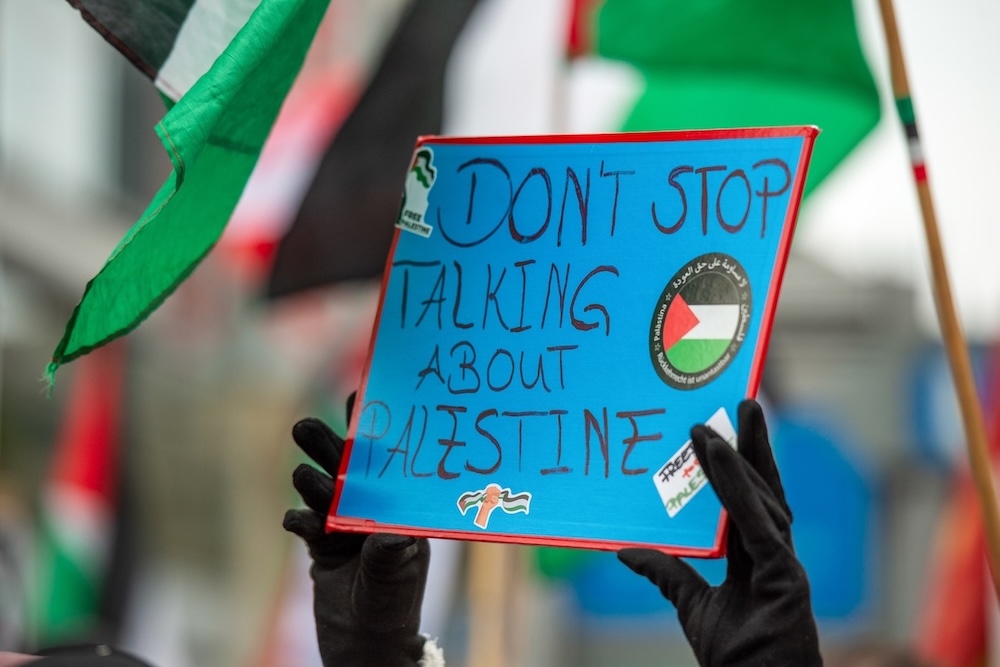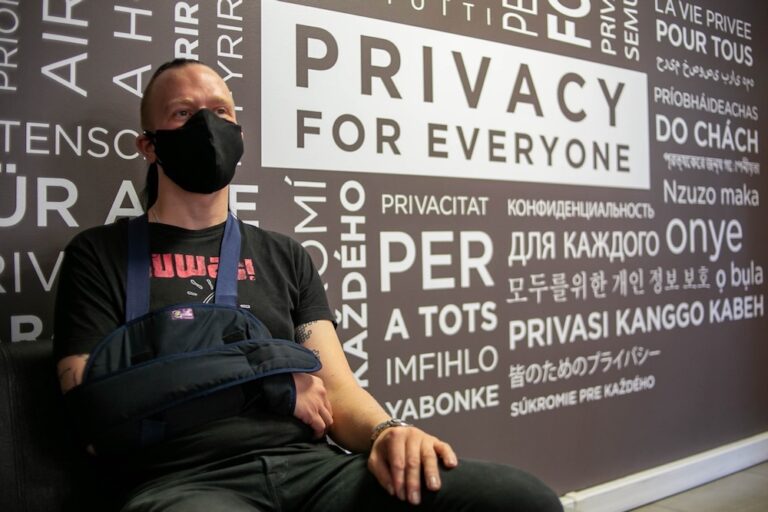November 2024 in Europe and Central Asia: A free expression round-up produced by IFEX's Regional Editor Cathal Sheerin, based on IFEX member reports and news from the region.
Germany wavers on commitment to international justice and increases efforts to gag criticism of Israel; Trump’s election puts spotlight on safety of journalists in Europe; a wave of repression ahead of Belarus’s presidential election in January; the damage inflicted on Ukrainian media by 1,000 days of war; EU states urged to act on cyber-harassment of women journalists.
Tackling anti-Semitism by targeting free speech and migrants
As Human Rights Watch (HRW) points out in a recent explainer, all EU member states are obligated to arrest individuals on their territory if the International Criminal Court (ICC) issues a warrant for their arrest.
However, when asked about the ICC arrest warrant issued this month for Israeli Prime Minister Benjamin Netanyahu – wanted for “crimes against humanity” – some EU members refused to commit to enforcing it.
Among this group was Germany, which, while wavering on its commitments to international justice, also continued its efforts to restrict civic space at home in order to shield Israel from legitimate criticism.
One of these efforts bore fruit in early November when the Bundestag adopted a resolution which, though aimed at combating anti-Semitism in Germany, in fact threatens civil society organisations, freedom of expression, and freedom of assembly.
The non-binding resolution, entitled “Never again is now: Protecting, preserving and strengthening Jewish life in Germany”, calls for state funding cuts and bans for groups or projects that promote boycotts of Israel, support the Boycott Divestment and Sanctions (BDS) movement, or “question” Israel’s right to exist. It is the result of several months of behind-closed-doors discussion between the ruling centre-left coalition government and the centre-right opposition. The only party to vote against the resolution was the left-wing populist Sahra Wagenknecht Alliance (BSW).
The resolution ties state funding to the International Holocaust Remembrance Alliance’s (IHRA) controversial definition of anti-Semitism, which has been adopted or endorsed by 43 countries (including Germany). Rights groups have frequently pointed to how the definition has been used to conflate criticism of Israel’s government with anti-Semitism and illegitimately restrict free speech.
Two examples of anti-Semitism included in the definition are frequently highlighted as being particularly problematic.
The first of these – “Denying the Jewish people their right to self-determination, e.g., by claiming that the existence of a State of Israel is a racist endeavour” – leaves individuals or organisations vulnerable to accusations of anti-Semitism if they criticise the Israeli state’s ongoing apartheid practices (which have been recognised as such by the International Court of Justice, the UN Special Rapporteur on the situation of human rights in the Palestinian Territory occupied since 1967, and various rights organisations including Human Rights Watch and Amnesty International).
The second – “applying double standards by requiring of [Israel] a behaviour not expected or demanded of any other democratic nation” – also opens the door to accusations of anti-Semitism if an individual or organisation criticises the Occupation or focuses on Israeli rights abuses while/if worse ones are being committed elsewhere.
Among those concerned that the IHRA definition of anti-Semitism has been “weaponised” to “chill” critical speech about Israel is the actual lead drafter of the IHRA definition.
As the perpetrator of The Holocaust, Germany has made the protection of Israel and Jews its “Staatsräson” (reason of state), and politicians across all parties subscribe to this unique, self-imposed obligation. In 2019, the Bundestag passed a resolution describing the BDS movement as anti-Semitic. Criticism of Israel, especially since the beginning of the bombardment of Gaza in October 2023, is frequently interpreted as anti-Semitic, and the policing of peaceful events where Israel is criticised often tramples on free expression and free assembly rights. This year has seen the former finance minister of Greece banned from Germany, an eminent Palestinian surgeon deported, young children detained, numerous protesters brutally beaten, the homes of pro-Palestinian activists raided, and queer-feminist support centres shut down – all as a result of the German authorities’ determination to smother pro-Palestinian protest and criticism of Israel.
Critics of the new resolution argue that it will increase self-censorship at a time when pro-Palestinian rights defenders, artists and intellectuals in Germany are already under pressure to stay silent. The last thirteen months have seen several high-profile cases of censorship or de-platforming based on criticism of Israel or questionable allegations of anti-Semitism. In 2023 alone, 25% of those censored on such grounds were Jewish. In October 2024, Jewish intellectuals in Germany published a letter condemning the German authorities’ attempts to suppress criticism of Israel’s actions in Gaza:
“We fear that with the current suppression of free speech, the atmosphere in Germany has become more dangerous – for Jews and Muslims alike – than at any time in the country’s recent history. We condemn these acts committed in our name”
Public letter signed by Jewish intellectuals in Germany
In a separate letter published in August 2024, over 150 Jewish artists and intellectuals criticised the new resolution (then in draft) for conflating criticism of Israel with anti-Semitism and fixating “on artists, students and migrants as the country’s most dangerous perpetrators of anti-Semitism”. (Recent statistics show that the vast majority of anti-Semitic crimes are committed by the Germany’s homegrown extreme-right.)
The final language of the resolution – which was backed by the far-right, anti-immigrant, Islamophobic Alternative for Germany (AfD) – explicitly attributes blame for anti-Semitism to Muslim migrants. According to the text (quoted in Deutsche Welle), “the alarming extent of anti-Semitism based on immigration from countries in North Africa and the Middle East, where anti-Semitism and hostility towards Israel are widespread, partly due to Islamist and anti-Israeli state indoctrination, has become clear”. The resolution goes on to call for the “the national strategy against anti-Semitism” to be applied to “criminal law as well as residence, asylum and citizenship law”.
Not long after the Bundestag adopted the resolution, Germany’s Schelling Architecture Foundation rescinded a €10,000 prize it had awarded to British artist James Bridle (who uses they/them pronouns) after they signed a petition calling for a boycott of “Israeli cultural institutions that are complicit or have remained silent observers of the overwhelming oppression of Palestinians”. In communicating its decision to Bridle, the Schelling Architecture Foundation cited the new anti-Semitism resolution.
According to the German anti-Semitism watchdog RIAS, anti-Semitic incidents in Germany increased by 83% last year.
An NGO that monitors Islamophobia and anti-Muslim hatred in Germany reported a 114% increase in attacks on Muslims during the same period.
Trump’s re-election puts journalists’ safety in spotlight
November saw Donald Trump elected as President of the USA. Trump is notorious for his extremely hostile anti-press rhetoric and his previous term in office arguably emboldened authoritarian leaders and others around the world to target journalists and critics. Reacting to Trump’s re-election, the European Federation of Journalists (EFJ) issued a statement calling for better protection of journalists in Europe and warning of the risks to free speech and access to information posed by Elon Musk’s involvement in the Trump administration. EFJ’s General Secretary, Ricardo Gutiérrez, said:
“The most worrying element, in my eyes, is the collusion between the President of the world’s greatest power and the richest man in the world, Elon Musk, who has a frightening capacity to control public opinion through social networks. He appears as a particularly influential political actor of the extreme right. It is now urgent that the European Union (EU), as a regional power, regulates the domination of American and Asian Big Tech, via the EU Digital Markets Act (DMA) and the EU Digital Services Act (DSA).”
EFJ’s Ricardo Gutiérrez
Just days before Trump’s election win, EFJ marked the International Day to End Impunity for Crimes against Journalists (2 November) by reminding us of the ongoing risks to journalists’ safety across the continent, and of the impunity enjoyed by so many who attack and kill them. EFJ highlighted six cases of killings where no – or only partial – justice had been served: Daphne Caruana Galizia (Malta), Giorgos Karaivaz (Greece), Jan Kuciak (Slovakia), Slavko Ćuruvija (Serbia), Martin O’Hagan (Northern Ireland) and Hrant Dink (Turkey). The country with the worst record for impunity in Europe, as EFJ pointed out, is Kosovo, where 19 Serbian and Albanian journalists were killed, abducted or disappeared between 1998 and 2005.
Repression intensifies ahead of election in Belarus
With Belarus’s presidential election scheduled for 26 January 2025, the persecution of critical voices is intensifying.
Early November saw more than 100 people arrested across the country. According to human rights group Viasna, many of these individuals were targeted for participating in online chat groups created by residents of apartment blocks. Chat groups such as these took off in 2020, when they offered a way for citizens to communicate privately, to organise, and to protect themselves during the massive wave of repression that followed the rigged August presidential election.
As the grim statistics demonstrate, that repression has continued unabated:
- There are currently over 1,280 political prisoners, of whom 36 are journalists.
- Since 2020, over 1,200 people have been convicted of ‘slandering’ and ‘insulting’ President Lukashenka.
- At least 1,838 civil society organisations have been ordered to liquidate, or have opted to do so themselves under pressure.
- All imprisoned presidential candidates who stood against Lukashenka in 2020 are currently held incommunicado.
In November, the Belarusian Association of Journalists (BAJ) launched ‘Word Behind Bars’, a social media video campaign raising awareness of the plight of Belarus’s jailed journalists. The videos (which you can check out here) highlight individual cases where journalists have been imprisoned on politically-motivated charges.
BAJ’s Solidarity Marathon for jailed journalists continues, with November seeing solidarity actions in Estonia.
In brief
In November, IFEX members marked 1,000 days of Russia’s invasion of Ukraine. The Institute of Mass Information (IMI) issued a statement highlighting the devastating effects of Russia’s war on Ukraine’s media, which has seen 329 media outlets forced to close. The members of the Media Freedom Rapid Response platform highlighted the 13 journalists killed while reporting and the dozens who have been wounded. Also this month, IMI published a list of 112 Ukrainian and foreign journalists who have been “detained or taken hostage by Russian and pro-Russian forces” since Russian aggression began in 2014. Thirty of them are still in Russian custody.
On the International Day for the Elimination of Violence Against Women (25 November), Reporters Without Borders called on EU member states to swiftly implement a 2022 Directive on combating violence against women and domestic violence. The Directive criminalises cyber harassment against women and acknowledges that there is a higher risk of harm when cyber-violence is directed at specific categories of women, such as female journalists.
IFEX joined the Coalition Against SLAPPs in Europe (CASE), Free Press Unlimited and several press freedom organisations in a statement raising our concerns over the draft implementation in the Netherlands of the European anti-SLAPP directive. The statement demonstrates how the Dutch draft implementation act fails to provide sufficient safeguards to protect journalists from SLAPP cases and makes recommendations for more effective measures.
The International Press Institute, Croatian fact-checking outlet Faktograf, and the German newspaper taz have launched a new platform documenting disinformation campaigns targeting journalists and media houses in Europe.



